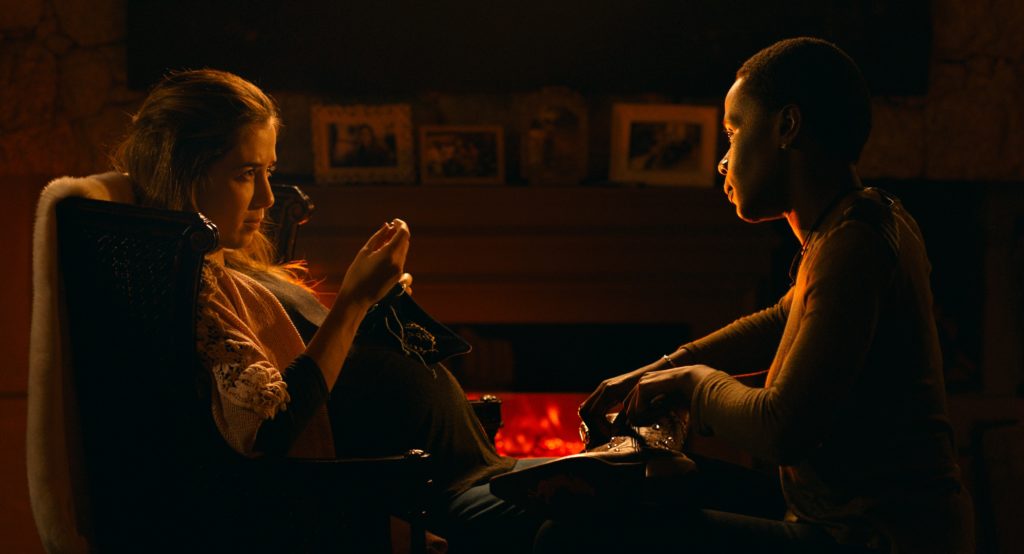Unsurprisingly for a film infused with magical realism, “Good Manners” was first conceived in a state of sleep: “the original image came from a dream of [co-director Marco Dutra’s]: two women living in an isolated house, and raising a strange baby,” writer-directors Juliana Rojas and Dutra explained in an interview. In developing their idea, the duo — who have worked together for almost two decades on numerous shorts, and the feature film “Hard Labor” — began to explore the folklore of the werewolf, heavily mythologized in their native Brazil.
The film is led by Clara (Isabél Zuaa), a black woman who lives in the outskirts of São Paulo and who is hired by the upper-middle-class, light-skinned Ana (Marjorie Estiano) as a nanny for her soon-to-be-born son. Seemingly utterly different, the two women soon begin to recognize the other for who she really is, and a deep intimacy develops between them, though there’s an ever-present concern about the impending birth of Ana’s child.
In crafting these two characters, Rojas and Dutra were keen to explore a number of themes, most notably motherhood, and class — and racial — divisions, that are hugely relevant to Brazilian society. “Nannies are a common figure in Brazilian middle and upper class families,” they explained in the film’s press materials. “They have a strong presence in the child’s upbringing and are considered a second mother to many.” The concept is not foreign to their work, with “Hard Labor” having tackled similar issues, nor indeed to Brazilian cinema in general: Anna Muylaert’s aptly-titled 2015 film “The Second Mother” deftly unpacked the effects of these social formations in the country’s heavily gentrified cities.
But where “Good Manners” most obviously differs is in its embrace of genre, with both horror and musical elements woven into the film’s fabric. Its version of São Paulo is dreamlike, captured beautifully by Portuguese cinematographer Rui Poças, whose recent credits include Lucrecia Martel’s “Zama,” and in the production design, led by Fernando Zuccolotto, that harks back to classic filmmaking practical effects. To draw viewers’ attention to the fantasy elements, artist Eduardo Schaal was hired to create matte paintings for use in the background of key shots, drawing on the likes of Powell & Pressburger and Hitchcock’s oeuvre, as well as the paintings of Disney artist Mary Blair. It makes for wonderfully stylized visuals, aided by careful use of shadow, color, and light to differentiate key themes and highlight contrasts.
At its heart,“Good Manners” is a film of contrasts and the nature of duality, and nowhere is that more apparent than in the narrative’s two-act structure, which Rojas and Dutra had always intended to split evenly with a violent and decisive event that alters Clara’s preoccupations. This allows the filmmakers to address motherhood from two different viewpoints while referencing Bertolt Brecht‘s parenthood parable, “The Caucasian Chalk Circle.”
Following its premiere at Locarno Film Festival in 2017, where it screened in competition and was awarded the Special Jury Prize, the film has enjoyed a vigorous run on the international festival circuit, and a recent theatrical release in Brazil. It’s due for a limited run in New York and Los Angeles this July and August.
Upcoming screenings:
Wednesday, July 4 and Thursday, July 5, 2018 – Filmfest München – Munich, Germany
Thursday, July 26, 2018 – German theatrical release
Friday, July 27, 2018 – IFC Center, NY – New York City (Theatrical release)
Friday, August 17, 2018 – Laemmle Royal – Los Angeles (Theatrical release)
Under the Radar is Women and Hollywood’s newest feature. Published monthly, the post offers a chance for us to highlight works by and/or about women that haven’t received big releases or significant coverage in the press, but are wholly worthy of attention.
To recommend a title for this feature, please e-mail womenandhollywoodinterns@gmail.com.







